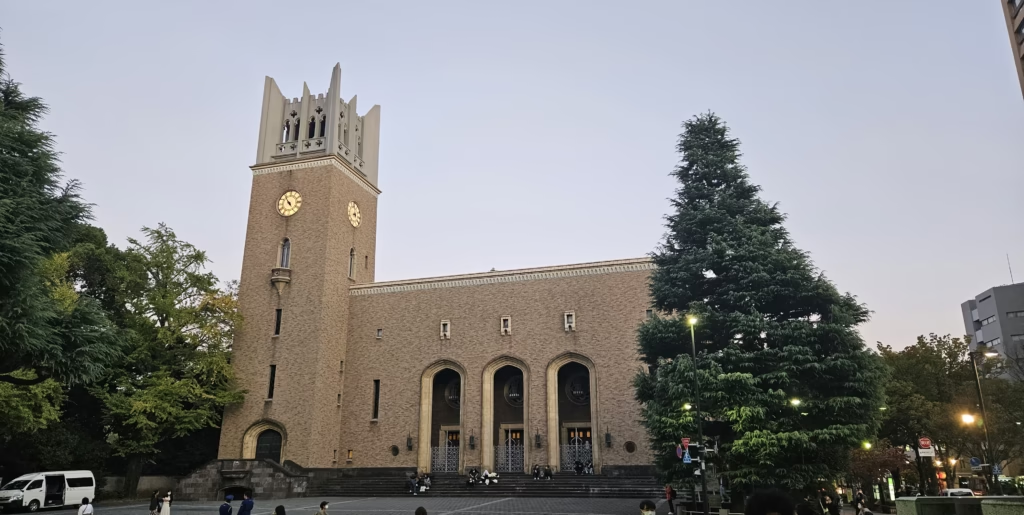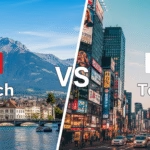
Deciding to move to Japan to pursue a Waseda CS Master’s as a foreigner in Computer Science (FSE) is no small decision—especially if you’re coming from Europe or another region with a very different education system. In this article, I’ll give you a personal and honest look at what it’s like doing the Waseda CS Master’s as a foreigner, going beyond just course content to explore daily life, research, and social opportunities.
Before the Beginning: Application Is a Journey in Itself
Although this post isn’t focused on how to apply, it’s worth noting that applying to Japanese universities from Europe can be confusing. Information isn’t always easy to find, and the structure of programs often differs from what European students are used to. If you’re still in the application stage, I highly recommend reading my detailed guide on how to apply to Japanese universities as a European student. That guide worked for multiple schools and will save you a lot of headaches.
Arrival: What to Do in the First Few Weeks
After acceptance, you’ll likely arrive in Japan about 2–3 weeks before your first semester begins. This short period is absolutely essential for settling in. You’ll need to complete several tasks quickly:
- Register at your local city office
- Enroll in national health insurance
- Set up a bank account
- Get a SIM card and internet
- Apply for a MyNumber card
All of these are important for establishing your life in Japan, and I’ve written a separate arrival checklist guide to help you navigate these tasks smoothly. Maybe give the culture shock guide also a try.
First Steps at Waseda: Contact Your Professor
The moment you arrive at Waseda, one of your very first priorities should be to get in touch with your assigned professor. As a graduate student, your lab is essentially your academic home base—it’s where you’ll conduct research, attend group meetings, and spend a significant amount of your academic life. Your professor, often referred to as your academic advisor or supervisor, will be your most important point of contact throughout your entire Master’s program.
Once you’ve made initial contact, your professor will likely introduce you to your lab group and add you to the lab’s internal communication channels, such as Slack, Microsoft Teams, or a university mailing list. These platforms are essential for staying up to date with lab meetings, deadlines, shared resources, and informal announcements. This is also where you’ll learn about ongoing research projects, potential collaboration opportunities, and administrative tasks that are relevant to your work.
In many cases, these lab groups also serve as a small academic community within the larger Waseda ecosystem. You’ll get to know fellow students, postdocs, and researchers who can offer guidance, answer questions, or even become close friends. Building a strong relationship with your professor and lab mates from the beginning will make a huge difference in how smoothly and successfully your Master’s journey unfolds.
Administrative Setup at Waseda
Before your classes officially begin at Waseda, you’ll go through a few essential administrative steps to get fully set up as a student. Fortunately, Waseda has a well-organized process in place for this, especially for international students. Everything is clearly explained in English, and the staff are generally very helpful if you have any questions or run into problems along the way.
One of the first things you’ll do is set up your MyWaseda account, which is the central online platform for all student services. You’ll use it to register for courses, check announcements, manage your schedule, and access important documents. After that, you’ll receive your student ID card, which acts as your official university identification—it’s used for things like entering campus buildings, using the library, and accessing certain university systems.
You’ll also attend a few orientation sessions, which are highly recommended, if not mandatory. These are designed to help you understand how the university functions, introduce you to campus resources, and walk you through procedures like health insurance registration, opening a bank account, or setting up a SIM card if needed. Some orientations will be general, while others might be specific to your faculty or department.
These steps might sound like a lot, but Waseda makes the process very manageable. You’ll typically receive a detailed schedule or checklist outlining what you need to do, when, and where to go. Most of these tasks are completed within the first week or so after arrival, and by the time classes start, you’ll feel settled and ready to dive into academic life.
Use ICC to Integrate Socially
The Intercultural Communication Center (ICC) at Waseda is a must-use service, especially for international students. Waseda ICC exchange runs a variety of programs to help you meet people and get involved:
- Campus tours
- Welcome cafés
- Country-themed events
- Language exchanges
Even though I speak English fluently, I joined the English language exchange and was grouped with two Japanese students. We hung out several times over food and conversation. This is a great way to make friends and ease into the social environment. It’s one of the best features of the Waseda ICC exchange programs.
Course Registration Each Semester
Course registration at Waseda happens at the start of each semester. While it can seem intimidating at first, the system is logical and well-documented.
Course Load
You’ll need to complete:
- 9 lectures
- 2 “Special Laboratory” courses (A & B)
- 1 seminar per semester (they are kind of your grade for the thesis)
- A Master Thesis (You will not get a grade for it)
For my Waseda CS Master’s as a foreigner, I never had any issues getting into my required courses. This is usually the case for most Computer Science Master’s lectures.
However, Waseda course registration can be competitive when it comes to Japanese language classes, which use a lottery system. Still, I highly recommend these courses because they are low-cost and give you unlimited access throughout the semester.
My Personal Course Plan
To give you a concrete example, here’s the course schedule I followed:
1st Semester
- Cloud Systems
- Advanced Wireless Access
- Autonomous Agent Systems (Online)
2nd Semester
- Reliable Software
- Software Quality Assurance
- Multimedia Representation and Content Distribution Systems
- Info-Telecommunication and the Standardization
3rd Semester
- Advanced Course in Computer Graphics
- Information Retrieval
I passed all courses without any major struggles. Most of them were based on assignments rather than final exams, which made the workload manageable.
Japanese Language Courses
As mentioned earlier, language courses are affordable and useful. Even if you don’t need Japanese for your studies, learning the language will help you navigate life in Tokyo. These classes are part of what makes the study Computer Science Japan experience so rewarding.
Research: The Core of Your Master’s
While coursework is relatively straightforward, research is where you’ll spend most of your time. You’re expected to join a lab and start working on your thesis topic early. Depending on your lab, the process varies:
- Some professors give you a topic
- Others expect you to propose your own
- You may work alone or as part of a group
In the first year, you’ll mostly read academic papers and narrow your research focus. In the second year, you’ll work on implementing your project. Your thesis is the main output of the degree.
Labs also hold occasional social events like Nomikai (drinking parties), but don’t worry—participation is optional and respectful of cultural and dietary differences.
Diversity and International Community
Waseda is known for being one of the most international universities in Japan. Most students in the English-taught Computer Science Master’s program are foreign nationals, including many from China amd Southeast Asia. There are fewer Europeans, mainly due to higher tuition costs compared to home universities.
Still, the environment is welcoming, and you’ll find support networks easily. Being part of the international student Waseda community makes a huge difference when adjusting to life abroad.
Country-Specific Events and Cultural Integration
Waseda hosts several country-specific events in collaboration with embassies and student groups. These are great networking opportunities and help you stay connected with your roots while meeting people interested in your culture.
At one point, I attended a Switzerland-themed event that included a presentation and networking session with the embassy. Events like this enrich your experience and expand your network.
Life in Tokyo as a Student
Living in Tokyo on a student budget is possible with some planning. Here’s a rough monthly budget:
| Expense | Monthly Cost (JPY) | 2-Year Total (JPY) |
|---|---|---|
| Food & Groceries | 40,000 | 960,000 |
| Utilities (electricity, water, gas, internet) | 10,000 | 240,000 |
| Health Insurance (NHI) | 2,000 | 48,000 |
| Transportation | 8,000 | 192,000 |
| Phone Plan | 3,000 | 72,000 |
| Entertainment & Shopping | 10,000 | 240,000 |
| Miscellaneous | 5,000 | 120,000 |
| Total per Month | 110,000 | 2,640,000 |
Many students also take up part-time jobs (up to 28 hours per week) if their schedule allows. However, the demands of your thesis may make this difficult in the second year. If you want to see the full prices, then you can check my costs of living guide for Tokyo as a student.
Final Thoughts: Is the Waseda CS Master’s Worth It?
In short—yes. Doing the Waseda CS Master’s as a foreigner offers not just academic growth, but also personal transformation. You’ll experience:
- A flexible, assignment-based curriculum
- Research mentorship and lab integration
- Access to global events and cultural programs
- A supportive international student community
Whether your goal is to work in Japan, continue into a PhD, or return to your home country with a globally respected degree, Waseda gives you the tools to succeed.
If you’re considering whether to study Computer Science in Japan, this program provides one of the best environments to do so.
Useful Resources
Want help preparing your application or choosing your courses? Drop a comment or get in touch—happy to help fellow international students navigate Waseda!
Stay ahead of the game with exclusive travel tips, insider guides, and behind-the-scenes stories—subscribe now and never miss an adventure! 🚀✈️






